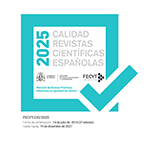The Effective and the Controversial Uses of Code-Switching: Edwidge Danticat’s 'Claire of the Sea Light' as Case Study
Abstract
This article explores the different uses that Haitian-American author Edwidge Danticat makes of code-switching in her last novel Claire of the Sea Light (2013). It also delves into the effects Danticat seeks to produce on her readers by the introduction of Creole words and expressions. While the incorporation of the mother tongue is not new in Danticat’s fiction, critics have paid little attention to the diverse purposes such a tongue purports to serve in her books and to the kind of responses it has aroused from her audience. Her uses of code-switching are observed to pursue various purposes: some purely mimetic, others more closely related to her stylistic ambitions, and still others out of motivations that may be deemed debatable, as they pertain to the “exoticization” of her homeland. Ultimately, the use of code-switching in Claire of the Sea Light should be viewed as one of the most effective strategies that diasporic writers envisage to satisfy a number of important socio-pragmatic and rhetorical functions that are usually expected in ethnic fiction. These strategies also aim to guide the (mainstream) readers’ affective responses to their work in the way(s) “minority” authors believe best suit their aesthetic and ethical goals.
Downloads
Article download
License
In order to support the global exchange of knowledge, the journal Complutense Journal of English Studies is allowing unrestricted access to its content as from its publication in this electronic edition, and as such it is an open-access journal. The originals published in this journal are the property of the Complutense University of Madrid and any reproduction thereof in full or in part must cite the source. All content is distributed under a Creative Commons Attribution 4.0 use and distribution licence (CC BY 4.0). This circumstance must be expressly stated in these terms where necessary. You can view the summary and the complete legal text of the licence.









